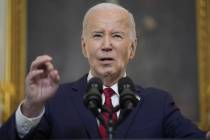‘Entity’ betting carries some risk
Senate Bill 346 is looking like a favorite at the Nevada Legislature.
The bill would allow investor groups to bet as a single “entity” much in the way hedge funds pool their money. Proponents of SB346 say it could bring millions of dollars in sports wagering to Nevada, money that now is bet illegally in the 49 other states where such gambling is forbidden.
While that sounds like a dandy idea on the surface, it would change a fundamental element of Nevada law. And although its backers say safeguards could be put in place to ensure transparency, multiple law enforcement sources and Nevada Gaming Control Board Chairman A.G. Burnett are concerned that just the opposite might be the case.
It might bring money, but it almost certainly would bring heat in the form of increased law enforcement scrutiny of the state’s sports gambling industry.
Heat is something one of SB346’s key proponents, Cantor Gaming, knows something about these days. Cantor Gaming’s Lee Amaitis, who spoke on behalf of the bill at last week’s Senate Judiciary Committee hearing, arched eyebrows in the sports book industry when he touted his friendship with mega-sports bettor Billy Walters in a 2011 “60 Minutes” broadcast. The entity betting idea is not new to Walters, and Amaitis is a hedge fund expert and former CEO of Cantor Fitzgerald.
But the Amaitis-Walters friendship pales in comparison to the scandal that broke in October 2012 when Cantor Gaming sports book director Mike Colbert was arrested in Las Vegas in connection with a sports betting investigation out of Queens County, N.Y. Colbert, one of Cantor Gaming’s ground-floor employees, is charged with enterprise corruption, conspiracy to operate an illegal gambling enterprise and three counts of money laundering.
According to the indictment, he helped arrange for the transfer of at least $100,000 in gambling proceeds between Las Vegas and New York in July 2011. The case also involves associates of the Pinnacle sports book of Curacao and New York organized crime elements. Colbert was based at the M Resort. A Cantor spokesman said it is cooperating with the investigation.
Controversy, what controversy?
Sponsored by Sen. Greg Brower, a former U.S. attorney, SB346 appears to have plenty of friends on the Senate Judiciary Committee. In the recent hearing, Republican Brower and Democratic Sen. Tick Segerblom led a chorus of support for the bill.
“It only works if the regulators can come up with regulations that make sense,” Brower says. “I think it has potential, but the devil’s in the details, and we need to get the details right. ... This is something that has tremendous upside potential. That’s why I put the bill in.”
The recent legislative concert wasn’t officially sponsored by Cantor-related companies, but you’d be forgiven for thinking so. A glance at the secretary of state’s website shows a generous pattern of campaign contributions: $139,500 since January 2012, including $25,000 to the Senate Majority PAC in recent months. Over that same time period, Amaitis has contributed $67,000, including $25,000 to Nevada Senate Democrats, $25,000 to Senate Majority PAC, and $10,000 to Brower.
If SB346 has no shortage of friends in the Senate, it also has powerful allies. Gaming regulation legal expert Bob Faiss and former U.S. Sen. Richard Bryan have helped craft its language.
At the hearing, the bill was embraced by former Nevada Gaming Control Board members Mark Lipparelli and Randall Sayre, who now earn their livings consulting and lobbying for elements of the gaming industry. Lipparelli spent the final months of his tenure with the state traveling and promoting Nevada as possessing the right regulatory atmosphere to regulate Internet poker once it becomes legalized. For his part, Sayre testified on behalf of controversial Internet poker entities in a previous legislative session.
While the former regulators are on board, it is current Control Board Chairman Burnett whose outfit would be challenged to enforce the new law. Would it send a red flag to the FBI, IRS, and the U.S. Department of Treasury’s Financial Crimes Enforcement Network?
Burnett says he is all for any change that helps the state’s industry — if it doesn’t lead to a regulatory tangle.
“It just begs a lot of questions of us as regulators, I think,” Burnett says. “I’m certainly amenable to anything that will help the state of Nevada in any way, shape, or form as long as it’s above board and legal.”
But, Burnett wonders, “How do we ensure that the people are who they say they are?”
I am left wondering whether the control board’s already harried investigators will be able to add this complex assignment to their workload.
I do not wonder whether federal agencies charged with tracking money laundering will monitor the bill as it moves through the Legislature.
While former regulators Lipparelli and Sayre extolled its upside promise of millions of dollars to Nevada that were wagered illegally elsewhere, federal law only allows wide open sports betting in this state.
The odds favor the passage of SB346, but I think its proponents would be wise to take it off the board while they can.
John L. Smith’s column appears Sunday, Tuesday, Wednesday and Friday. Email him at Smith@reviewjournal.com or call 702-383-0295. Follow him on Twitter @jlnevadasmith.























